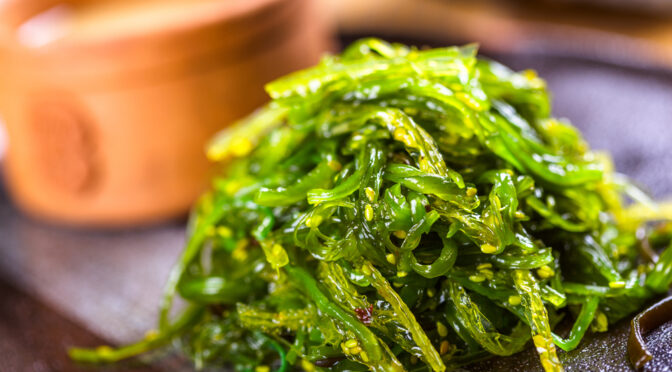By now, we all know the benefits of superfoods like kale, spirulina, and wheatgrass, but have you heard of the myriad of health benefits seaweed can offer?
Living in a Westernized society, we might eat seaweed in our California rolls, but it’s not typical behaviour for someone to snack on a bag of the stuff. Well, maybe it should be! After reading all the ways in which seaweed can benefit your health, you might develop an urge to start including it in your diet.
- Seaweed is a natural anti-oxidant, and is high in iodine and calcium. Have you been eating some rather unhealthy foods lately? More and more labels read “irradiated” and “modified” ingredients. A healthy dose of seaweed can help to combat those toxins.
- Shona Wilkinson, the head nutritionist at NutriCentre explained, “It is a natural source of vitamins A, B1, B2, C, D and E as well as minerals including zinc, iodine, magnesium, iron, potassium, copper and is especially high in calcium. It is also very high in iodine. We need iodine for efficient thyroid and pituitary function. The thyroid is responsible for regulating metabolism and body temperature. “
- Seaweed can help reach and maintain a healthy weight, by being a useful diuretic. Those who struggle with water retention will find this doubly useful. An additional functionality of diuretic properties, seaweed also cleanses the system.
- Seaweed contains a strikingly similar chemical composition to our own blood plasma. Because of this, it is extremely helpful in purifying and regulating the toxins in our bloodstream.
- Seaweed is believed to have anti-cancer properties. One study suggests, specifically breast cancer cells, are reduced due to the effects seaweed has on endocrine hormones. These same hormones contribute to increased female
 fertility and more pleasant PMS symptoms.
fertility and more pleasant PMS symptoms.
Now, before you start adding seaweed to all your meals, or taking kelp tablets every day, keep a few things in mind:
Seaweed is just like any other food- where it grows is important.
If you get your seaweed from a water source that is high in contaminants, guess what? Your seaweed will also be contaminated. The FDA has pretty strict guidelines for consumable seaweed, but tablets and supplements are not regulated. That means it is up to you to find a reputable and organic source, if you choose to take tablets.
Moderation is the key. While a good a mount of people suffer unknowingly from iodine deficiency (it’s what contributes to obesity depression, fatigue, and inflammation) there is “too much of a good thing.”
One, 2 tablespoon serving of brown seaweed, or kelp, has enough iodine to benefit your body for a full week.
Consuming more than what the body requires could have unwanted side effects. (If you are a sushi lover, don’t worry.
Nori is the type of seaweed used, and it has a much lower iodine content than brown seaweed, or kelp.)
Now that you know the benefits of seaweed, try including it in your meals once a week and see how you feel. I know you’ll notice a difference. The proof is in the pudding seaweed.
By Raven Fon

